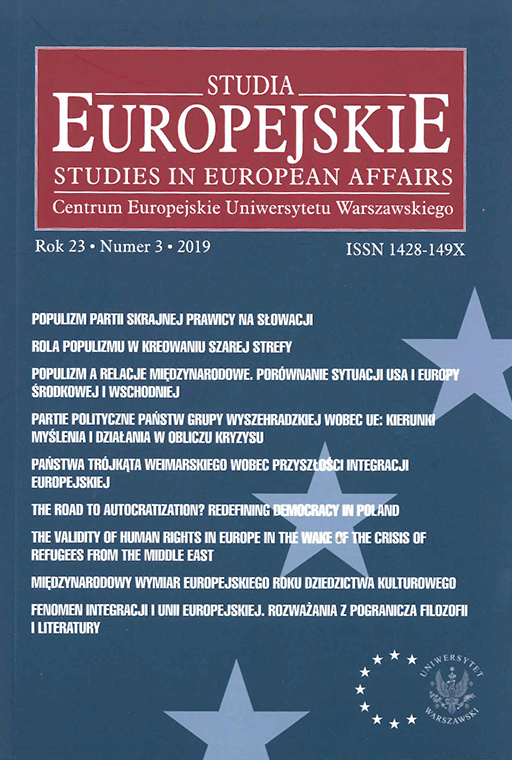
ISSUE: 3/2019
- Volume 23
- Number 3
- 2019
Subscribe NEWSLETTER
Studia Europejskie –
Studies in European Affairs
ISSN: 1428-149X
e-ISSN: 2719-3780
License
Articles published in the journal are under a Creative Commons Attribution – Non Commercial – No Derivatives 4.0 International License
Rola populizmu w kreowaniu szarej strefy
The Role of Populism in the Shadow Economy Creation
Abstract
The manuscript deals with the populism in the context of shadow economy creation and development. The correlation between shadow economy and populism was identified. The index of populism created by Think Tank Timbro was applied, but the size of the shadow economy was calculated based upon MIMIC approach. 28 countries were taken into an account. The typically threats of populism as the impact for shadow economy were presented.
References
Abts K., Rummens S., Populism versus Democracy, „Political Studies”, no. 55(2)/2007, DOI: https://doi.org/10.1111/j.1467-9248.2007.00657.x.
Blank D.E., Politics in Venezuela, Little, Brown, Boston 1973.
Canovan M., Trust the People! Populism and the Two Faces of Democracy, “Political Studies”, no. 47/1999, DOI: https://doi.org/10.1111/1467-9248.00184.
Cichocki S., Metody Pomiaru Szarej Strefy, „Gospodarka Narodowa”, nr 1–2/2006.
Corrales J., Cisneros I., Corporatism, Trade Liberalization and Sectoral Responses: The Case of Venezuela, 1989–1999, “World Development”, no. 27/1999, DOI: https://doi.org/10.1016/S0305-750X(99)00105-9.
Cuperus R., The Populist Deficiency of European Social Democracy, “Internationale Politik und Gesellschat”, no. 3/2003.
Crespo F., Institutional Legitimacy and Crime in Venezuela, “Journal of Contemporary Criminal Justice”, vol. 22, no. 4, November 2006, DOI: https:// doi.org/10.1177/1043986206297094.
Dell’Anno R., The Shadow Economy in Portugal: An Analysis with the MIMIC Approach, “Journal of Applied Economics”, 10, no. 2/2007, DOI: https:// doi.org/10.1080/15140326.2007.12040490.
De Krivoy R., Colaspo del Sistema Bancaria Venezolana de 1994, Ediciones IESA, Caracas 2002.
Derwich K., Kania M., Ruchy Społeczne i Etniczne w Ameryce Łacińskiej, Wydawnictwo UJ, Kraków 2011.
Di John J., Economic Liberalization, Political Instability, and State Capacity in Venezuela, “International Political Science Review”, vol. 26, no. 1/2005, DOI: https://doi.org/10.1177/0192512105047899.
Dimitrijević V., The Concept of National Interest and the International Position of Serbia, in Serbia at the Political Crossroads, CEDET and Friedrich Ebert Stiftung, Belgrade 2009.
Djankov S., Hungary under Orbán: Can Central Planning Revive Its Economy?, Peterson Institute for International Economics. Number P B 15-11, 2015.
Elgin C., Uras B.R., Public debt, sovereign default risk and shadow economy, “Journal of Financial Stability”, no. 9/2013, DOI: https://doi.org/10.1016/j. jfs.2012.09.002.
Ellner S., Rethinking Venezuelan politics: Class, conflict, and the Chávez phenomenon, Lynne Rienner Publishers, London 2008.
Gans-Morse J., Nichter S., Economic Reforms and Democracy Evidence of a J-Curve in Latin America, „Comparative Political Studies”, vol. 41, no. 10/2008, DOI: https://doi.org/10.1177/0010414007305811.
Galli R., Kucera D., Informal employment in Latin America: Movements over business cycles and the effects over worker rights, “International Institute for Labor Studies Discussion paper”, DP/145/2003.
Gomis-Porqueras P., Peralta-Alva A., Waller Ch., Quantifying the Shadow Economy: Measurement with Theory, “Research Division Federal Reserve Bank of St. Louis Working Paper Series” 2011, DOI: https://doi. org/10.2139/ssrn.1856254.
Greven T., The Rise of Right-wing Populism in Europe and the United States. A Comparative Perspective, Friedrich Ebert Stiftung, May 2016.
Haggard S., Kaufman R., The political economy of democratic transitions, Princeton University Press, Princeton, NJ 1995, DOI: https://doi. org/10.1515/9780691188010.
Hungarian Central Statistical Offi ce (HCSO). Budapest 2017.
Inglehart R.F., Norris P., Trump, Brexit, and the Rise of Populism: Economic Have-Nots and Cultural Backlash, “Harvard Kennedy School Faculty Research Working Paper”, no. 26/2016, DOI: https://doi.org/10.2139/ssrn.2818659.
Jakóbiak B., Jeznach M., Szara gospodarka w Polsce, „Wiadomości Statystyczne:, nr 4/1999.
Kaltwasser C.R., Mudde C., Voices of the People. Populism in Europe and Latin America Compared, “Kellogg Institute. Working Paper”, no. 378, July 2011.
LaFree G., Losing legitimacy: Street crime and the decline of social institutions in America, Westview, Boulder, CO 1998.
Mény Y., Surel Y., Par le Peuple, Pour le Peuple. Le Populisme et les Démocraties, Fayard, Paris 2000. Mróz B., Gospodarka nieofi cjalna w systemie ekonomicznym, „Monografie i Opracowania SGH”, nr 509/2002.
Müller J.W., Co to jest populizm?, Wydawnictwo Krytyki Politycznej, Warszawa 2017.
Ociepka B., Populism and National Identity, „Polish National Science”, vol. XXXV/2006. OECD Statistics, 2018.
Orhangazi Ö., Contours of Alternative Policy. Making in Venezuela, “Review of Radical Political Economics”, vol. 46(2)/2014, DOI: https://doi. org/10.1177/0486613413497914.
Pineiro C., Workplace democracy and collective consciousness: A study of Venezuelan cooperatives, “Monthly Review”, no. 59(6)/2007, DOI: https:// doi.org/10.14452/MR-059-06-2007-10_5.
Prizel I., National Identity and Foreign Policy. Nationalism and Leadership in Poland, Russia, and Ukraine, Cambridge University Press, Cambridge 1998, DOI: https://doi.org/10.1017/CBO9780511582929.
Rodríguez M.A., El Impacto de la Política Económica en el Proceso de Desearollo Venezolano, Universidad Santa Maria, Caracas 2002.
Sainz P., Pablo J., Zarembeka P., Accumulation and the state in Venezuelan industrialization, “Latin American Perspectives”, vol. 22, no. 3/1979.
Schneider F., Size and Development of the Shadow Economy in Germany, Austria and Other OECD Countries: Some Preliminary Findings, “Revue Economique”, no. 60/2009, DOI: https://doi.org/10.3917/reco.605.1079.
Székely M., Hilgert M., The 1990’s in Latin America: Another Decade of Persistent Inequality, “Working Paper. Washington, DC: Inter-American Development Bank” 1999, DOI: https://doi.org/10.2139/ssrn.1817208.
Timbro Authoritarian Populism Index 2016, https://beta.timbro.se/allmant/ timbro-authoritarian-populism-index-2016 (dostęp 5.06.2018).
Tugwell F., The Politics of Oil in Venezuela, Stanford University Press, Wallerstein, Immanuel, Stanford 1975.
Wilpert G., Changing Venezuela by taking power: The history and policies of the Chávez government, Verso, New York 2007. World Bank. Statistical Data, Washington 2002.
DOI: 10.33067/SE.3.2019.2
Language: Polish
Pages: 29-48
How to Cite:
Harvard
Buszko, A. (2019) "Rola populizmu w kreowaniu szarej strefy". Studia Europejskie – Studies in European Affairs, 3/2019, pp. 29-48. DOI: 10.33067/SE.3.2019.2